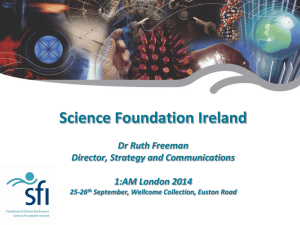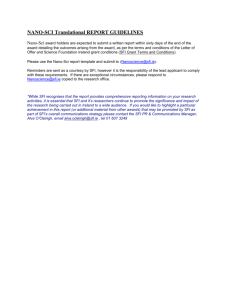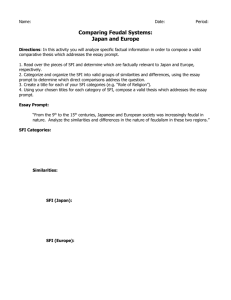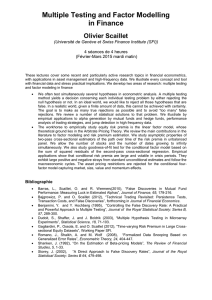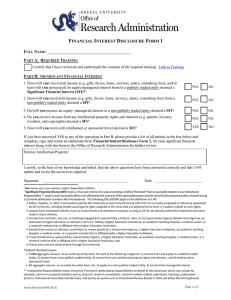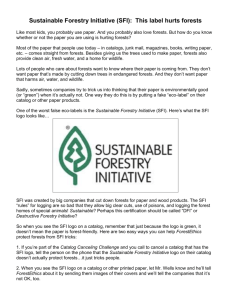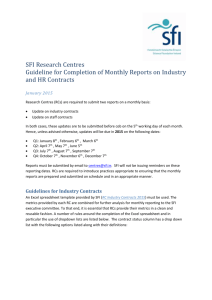Foreign Policy and Complex Adaptive Systems: Exploring New Paradigms for Analysis
advertisement
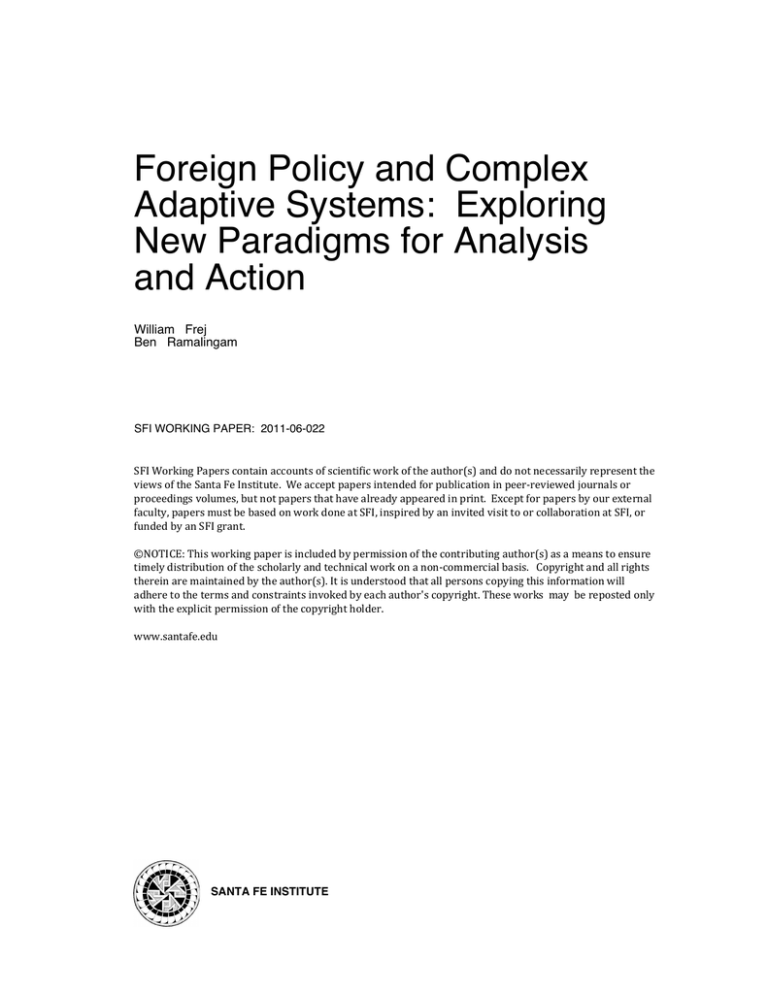
Foreign Policy and Complex Adaptive Systems: Exploring New Paradigms for Analysis and Action William Frej Ben Ramalingam SFI WORKING PAPER: 2011-06-022 SFI Working Papers contain accounts of scientific work of the author(s) and do not necessarily represent the views of the Santa Fe Institute. We accept papers intended for publication in peer-reviewed journals or proceedings volumes, but not papers that have already appeared in print. Except for papers by our external faculty, papers must be based on work done at SFI, inspired by an invited visit to or collaboration at SFI, or funded by an SFI grant. ©NOTICE: This working paper is included by permission of the contributing author(s) as a means to ensure timely distribution of the scholarly and technical work on a non-commercial basis. Copyright and all rights therein are maintained by the author(s). It is understood that all persons copying this information will adhere to the terms and constraints invoked by each author's copyright. These works may be reposted only with the explicit permission of the copyright holder. www.santafe.edu SANTA FE INSTITUTE Foreign Policy and Complex Adaptive Systems: Exploring New Paradigms for Analysis and Action By William Frej and Ben Ramalingam 1. The Challenges of 21st Century Foreign Policy In February 2011, a remarkable meeting took place at the Santa Fe Institute (SFI) in Santa Fe, New Mexico. SFI, one of the world’s preeminent academic and research institutions, has pioneered the use of concepts developed in studying complex adaptive systems to address environmental, technological, biological, economic and political challenges. In collaboration with the U.S. Agency for International Development (USAID), SFI brought together a group of policy-makers, academics, development experts, scientists, and Afghan tribal and business leaders. The task was ambitious: to develop new ways of thinking about and working in conflict-affected countries, with a special focus on Afghanistan and Pakistan. The participants had diverse interests, from how to shift to a long-term sustainable development approaches in such countries to how to better counter violent insurgency movements. The work by SFI and others on complexity and emergence in the context of conflict, behavioral dynamics, policy making, strategy formulation and sustainable development served as a framework for these important discussions, enabling participants to explore ways to bridge the gap between foreign policy decision-making process and a more innovative, scientific approach. As evidenced by the recent events in North Africa and the Middle East, and the almost daily changing terrain in Afghanistan and Pakistan, there are few certainties in foreign policy. From political turmoil to climate change to natural resource scarcity to food crises: we are today facing unprecedented global challenges which carry with them dramatic risks and vulnerabilities for developed and developing countries alike. The influential Millennium Project1 - set up by the Smithsonian Institution, Futures Group International, and the United Nations University - has developed and regularly updates a comprehensive list of these challenges, set out in Box 1 below. Box 1: 15 Global Challenges Facing Humanity (Millennium Project, 2009) 1. How can sustainable development be achieved for all while addressing global climate change? 2. How can everyone have sufficient clean water without conflict? 3. How can population growth and resources be brought into balance? 4. How can genuine democracy emerge from authoritarian regimes? 5. How can policymaking be made more sensitive to global long-term perspectives? 6. How can the global convergence of information and communications technologies work for everyone? 7. How can ethical market economies be encouraged to help reduce the gap between rich and poor? 8. How can the threat of new and reemerging diseases and immune micro-organisms be reduced? 9. How can the capacity to decide be improved as the nature of work and institutions change? 10. How can shared values and new security strategies reduce ethnic conflicts, terrorism, and the use of weapons of mass destruction? 11. How can the changing status of women help improve the human condition? 12. How can transnational organized crime networks be stopped from becoming more powerful and sophisticated global enterprises? 13. How can growing energy demands be met safely and efficiently? 14. How can scientific and technological breakthroughs be accelerated to improve the human condition? 1 15. How can ethical considerations become more routinely incorporated into global decisions? Looking down this list, it would be hard to deny that the international community is facing a ‘new normal’ world which only a decade ago was the province of futurists and doomsayers. Working out how to address these interconnected global challenges has dominated the major foreign policy fora, from NATO to the National Security Council, from the G20 to the annual conferences of the UN and the international financial institutions. These challenges have confounded policy makers and practitioners around the world, from military planners in Afghanistan and energy traders in New York to food security experts in Malawi and disaster responders in Japan. They have put scientists and academics on the back foot, scrambling to make sense of a world where new research is out of date before it reaches publication. This ‘new normal’ world presents significant challenges to the work of international and national actors alike – whether state, intergovernmental, corporate or not-for-profit. The problem is fundamentally one of relevance and appropriateness. Put simply, much of our current foreign policy and strategy does not match up well, in theory or in practice, to the problems we now face2. As well as intensifying existing vulnerabilities, these global challenges have exposed structural and institutional problems across the foreign policy pillars of defense, diplomacy and development. There is a growing sense that radical changes are needed that disrupt the existing status quo and make improvements in the way foreign policy actors go about their work. In this article we present a number of ideas that are emerging from what we see as a quiet revolution in complexity thinking across the foreign policy apparatus. We will do so by reflecting on the growing interest in complexity science, building on the lessons emerging from the February 2011 SFI-USAID high level working group. Our aim is threefold: • To explain the challenges we face in foreign policy today • To set out key ideas, insights and examples from research on complex adaptive systems that have relevance for these challenges, and • To set out some key principles for policy makers, practitioners and researchers to consider going forward. 2. The Limits of The Current Paradigm The crisis of globalization and the ‘new normal’ world presents a fundamental challenge for anyone operating in the public spheres. Whether in diplomacy, defense or development, too many practitioners across the three “D’s” have persisted in approaching the economic, natural and social systems as so many pieces of machinery, analogous to a series of windup clocks3. In effect, they have treated these systems as if they can be broken down into component parts, that the interactions of the parts can be perfectly understood, and that there are straightforward prescriptions for actions on these to effect desired changes. Such conventional and reductionist ways of analyzing and dealing with social and economic problems help break down difficult undertakings, but they don’t help deal with the complexity, uncertainty or ambiguity that characterizes the emergent behaviour these complex adaptive problems display. This way of thinking has led many in foreign policy (and indeed domestic policy, although that is a separate set of issues) to act as though they can predict and precisely manage the behaviour and outcomes of these systems. However, these ideas are increasingly being questioned in the face of repeated failures. To cite just a few examples: 2 • • • Dealing with Afghanistan as a country-specific ‘closed system’ problem meant that regional dynamics – crucially those involving Pakistan – did not play a sufficient role from the outset of the intervention. The inability to foresee the different implications of the changes across North Africa and the Middle East have caught many in the West off guard, with seemingly idiosyncratic and uncoordinated approaches taken by different countries. Efforts to spread the benefits of the Green Revolution from Asia to sub-Saharan Africa have met with continual problems, as the same approaches simply do not work in different contexts. As Murray Gell-Mann, Nobel Laureate and one of the founders of the Santa Fe Institute noted recently: ‘it is not merely that we have got things wrong, but that we have got things diametrically opposed to right’.4 Gell-Mann should know. For several decades now he and colleagues at the Santa Fe Institute (SFI) have been at the forefront of the attempt to understand complex adaptive systems. These, broadly defined, are systems that display unpredictable emergent behavior resulting from the interactions between their components. They are characterised by interconnectedness, feedback processes, non-linear change and tipping points, and emergent properties at the macro-level that cannot be predicted by understanding the component parts. As David Pines, another SFI founder, puts it, what is therefore needed is an emergent perspective on these problems—recognizing that because these have no unique cause, there is no unique solution, so the appropriate strategy is to experiment with many different solutions, searching for synergies between these that will enhance their effectiveness5. Small wonder that the foreign policy community is starting to pay more attention: these ideas seem to describe the turbulent world we live and work in today, give new insights into the kinds of failures we have been seeing, and also point toward how we might need to change our way of thinking and acting. Since its founding, researchers have come to SFI from all around the world to better explain different kinds of complex systems. Diverse disciplines have been represented at SFI, and as a result the Institute’s influence on policy and practice is diffuse and wide reaching. In addition to traditional scientists, there have been business strategists, diplomats, economists, military analysts and anthropologists. Underlying much of this work is a broad set of ideas and principles, often referred to as ‘complexity science’, which are getting greater interest and credence. SFI colleagues are at pains to say that it is still a building site and a true ‘science of complexity’ is still some way off. But there are many useful, fascinating, even groundbreaking foundations on this metaphorical building site that are well worth exploring. Over the past few decades, driven by work at Santa Fe and other institutes that have sprung up around the world, ideas from complex systems research have seen application in many fields of human endeavour, from economics, business, and military operations, to politics, information technology and environmental management. There are numerous ways in which these ideas have influenced how foreign policy is thought about and implemented, which illustrate well the quiet revolution alluded to earlier. For example: • In 2004, the CIA analyst Calvin Andrus wrote an award-winning paper on the need for a complex adaptive intelligence community6. Andrus argued that for decades, the US intelligence system had been structured to answer static, straightforward questions such as how many missiles were in Siberia. However, at the start of the 21st century there was a clear need for a different approach, one that could better handle complex, evolving threats such as global terrorism. Intelligence organisations themselves needed to become complex and adaptive in response to a changing world. This led to the design and launch of the award-winning web-based tool Intellipedia, which has become one of the most important information collaboration platforms for the US intelligence community. • General Stanley McChrystal7 recently wrote in Foreign Policy about his experience of leading the military operation in Afghanistan. He noted that in dealing with a networked enemy, there was a 3 • • need for the military to also work as a network, and that this presented numerous challenges to the traditional military command and control structures. And noted counterinsurgency advisor to General Petraeus David Kilcullen has spoken eloquently, including during the recent SFI meeting, about the use of social network analysis to design and operationalize counter-insurgency efforts in Iraq and Afghanistan. Col. Mark Mykleby and Capt. Wayne Porter, special assistants to Admiral Mullen, Chairman of the Joint Chiefs of Staff, have been applying the findings of their study of systems thinking to articulate a new perspective for the U.S. heading into the turbulent 21st century. “A National Strategic Narrative”, published in 2011 by the Woodrow Wilson Center under the pseudonym Mr. Y8, posits that if global security is a complex system, which their results strongly suggest, there is a need to deal with the world as a ‘strategic ecosystem’ and to reframe our National Security Strategy within this new framework. Key to this is to move away from the traditional approach of focusing attention on specific threats, risks, nations or organizations - and on attempting to exert control in closed systems - towards understanding the emergent trends that will shape tomorrow's strategic ecology, and aiming instead to have credible influence in open dynamic systems. According to Mr. Y: “there are opportunities and hopes [in] acknowledging converging interests and adapt[ing] to complex, dynamic systems, all bounded by national values.” There is also a growing movement in foreign aid, stemming from the work of a loose network of researchers and practitioners working in Europe, especially at the Overseas Development Institute, the Institute of Development Studies and Waginengen University, to explore the potential of complex systems research for addressing problems of poverty, vulnerability, disaster assistance and aid effectiveness9. An increasing number of research and operational projects in the development and humanitarian sectors are attempting to take account of and work with the principles of complex adaptive systems, leading to significant new ideas and approaches. 3. Working Together – Exploiting the Potential and Navigating the Pitfalls The February 2011 working group meeting at the Santa Fe Institute explored these potential interconnections in some detail. With the support of USAID, the workshop brought together seasoned diplomats, scientists, aid experts, and politicians. A number of the participants were leading figures from, or specialists in, Afghanistan, a country widely acknowledged as presenting perhaps the most complex foreign policy challenges we face today. The goal for this meeting was that the ideas, principles and approaches that emerged would not only assist senior foreign policy makers and implementers reframe and better understand the challenges they face, but could also be used to explore a new, scientifically grounded set of tools and resources for achieving their visions. A significant impetus for this approach was President Obama himself, as he stated in his September 22, 2010 Presidential Policy Directive on Global Development that metrics be adopted against which progress can be measured through “enhanced evidence-based analysis and data”.10 At this meeting, numerous examples were presented and highlighted by participants as having real world relevance and presenting a potentially useful approach for foreign policy experts and analysts attempting to navigate the kinds of global challenges outlined earlier. There were compelling illustrations of how ideas of emergence and self-organization could explain the current events across the Middle East and in particular the success of the revolutionary effort in Egypt and Tunisia, courtesy of one of SFI’s senior scientists, David Pines. 4 Using data collected by indigenous researchers, SFI faculty and noted anthropologist Paula Sabloff showed how a classic model in complexity theory can be modified to help visualize Mongolians' changing ideas about democracy and human rights. The model employed could be used to better compare demographic groups or populations, and to better understand how ideas emerge and move from internalized beliefs to societal values, clearly an approach that could be extremely relevant in assessing tribal dynamics in Afghanistan. Jessica Flack, an SFI professor, discussed how her work on the robustness of networks provided many diverse applications, from understanding counter-insurgency networks to enhancing ongoing efforts to map market development and economic growth. Aaron Clauset, a University of Colorado computational social scientist, presented his work on the dynamics of wars. He demonstrated how civil wars become self-sustaining after a certain point, and how institutional learning in opposition forces can be inferred by understanding the patterns of their attacks. And Simon DeDeo, an SFI Omidyar Post Doctoral Fellow, analyzed five years of violent events in Afghanistan to explore the scale of the conflict through time and space, and to work out how the scale of the conflict has shifted during the insurgency. Work highlighted by one of this paper’s authors on complexity science and foreign aid demonstrated how tools such as social network analysis and agent-based modeling can be used to better understand and deal with a whole range of phenomena, from malaria control, to economic development and perceptions of health interventions. The overarching conclusion of this ground-breaking meeting was that foreign policy analysts and experts need to become more aware of the vital importance of the principles of complexity in their work, and use these to better work with the reality of the social, political and economic systems they face. At the same time, scientists need to better understand the pressures of decision-making, the tension between theory and practice, the paucity of data, and the need for applied approaches that can provide effective insights for decision-making. Participants agreed that the ideas of the ‘complexity sciences’ could, in different contexts, greatly contribute to significant breakthroughs in how foreign policy efforts are analyzed, proposed and implemented and how foreign policy decisions are actually made. Collectively, a greater understanding of complex adaptive systems can help the foreign policy community, especially those who are making major decisions, by helping them rethink interconnected social, economic, political and natural systems; the patterns and dynamics of change that play out across these systems; and the nature of human actors and their collective behaviours. In particular, it was agreed that foreign policy experts and analysts needed to take account of the following key ideas11: • That the world is characterised by complex systems of elements that are interdependent and interconnected by multiple feedback processes, and that system-wide behaviours emerge unpredictably from the accumulated interactions among the parts. • That in complex systems, change processes are evolutionary and dynamic, are highly sensitive to initial conditions, and can shift dramatically with non-linear tipping points. • That complex human systems are populated by ‘adaptive agents’ that act in their own interests with their own view of the situation, who network with, react to and influence other actors and the wider system. Enhancing the adaptive capabilities and robustness of these networks is central to strengthening resilience, robustness and innovation. And for networks that are less desirable, the opposite is true. Following from this, complex systems research could be applied to foreign policy in two broad and mutually reinforcing ways. First, and most importantly from the perspective of the scientists in the room, 5 was the need to do empirical, data-driven scientific analysis of the kinds of phenomena faced in foreign policy to provide rigorous evidence-based insights. This demands resources but also foreign policy actors that are able to frame key questions and issues in ways that are amenable to scientific analysis. However, it was also felt that there was an important role for complex systems researchers to generate new mental models and new ways of thinking. In essence, this was based on the idea that the ‘world as clockwork’ analogy is now largely redundant, and that complexity science could provide a more realistic set of analogies to inform working principles. This would not be a straightforward task, as Ken Menkhaus noted in PRISM last year. The key is to inject a greater appreciation for complexity into foreign policy debates ‘without making our analyses completely indigestible for policymaking processes and programming’12. The following six principles were presented by us at the workshop and a subsequent SFI-sponsored lecture on “The Complexities of a Way Forward in Afghanistan”13 as a useful starting point for all sets of actors working in complex systems to challenge their way of thinking and acting. 1) To work to understand the systemic nature of the problems faced in foreign policy and how these problems evolve over time. 2) To involve those people who matter the most in the decisions that matter the most. 3) To avoid ‘silver bullet’ strategies and instead attempt multiple parallel experiments. 4) To establish real-time strategic analysis & learning as a key form of operational feedback. 5) To be open to the fundamental adaptation of efforts, along with changes in local contexts and conditions. 6) To reframe the overall foreign policy efforts as dynamic networks of multiple systems and actors.14 As discussed at the SFI meeting, applying these principles to the current situation in Afghanistan is not only critically important but also clearly possible. Taking a systemic perspective can lead policy makers to engage more substantively with regional dynamics, including Pakistan, India, China and Iran. It would also mean careful consideration of the once-unimaginable strategy of reconciling and reintegrating the Taliban into Afghanistan’s government and society. Involving those that matter most in the decisions that matter the most points to a speedier and more encompassing approach to decentralized governance. As noted Afghan-hand and Boston University anthropologist Thomas Barfield stated at the SFI event, “By devolving authority to those best positioned to govern effectively, the current Afghan government will become more rather than less robust.” Supporting the Afghanization of aid programs would complement the desire of the Afghan government to assume more responsibility for their country’s own development. Focusing on the involvement of those that matter most could also lead to a more expedient approach by President Karzai to implement reforms within his government, leading to a closer and more positive engagement with the international community. Implementing multiple, parallel strategies can enhance aid effectiveness while solidifying civilian-military cooperation to ensure that sustainable mechanisms are in place as the U.S. military begins to draw down its troops in July 2011. Learning from what is happening on the ground in real-time will guide both Afghanistan and Pakistan on a path to greater stability so that they assume responsibility for their own security, and will make Afghanistan less of a “Pakistan problem” than it is today. And, if the entire international community worked together as a dynamic network to seriously restructure the flow of aid to those individuals and institutions that are working within the rule of law, corruption could be dramatically reduced. However, it is also important to note that such principles are not currently followed as the norm. We agree with Stanley McChrystal that such ideas and principles are hard to promote within the existing bureaucratic frameworks of foreign policy. 6 Perhaps the most important implication of complexity science is that it suggests that all of us working in foreign policy, whether in defense, diplomacy or development, need to stop and reflect on how we are trying to solve the problems we face. Are we using inappropriate mental models and frameworks? Are we continuing to act in bureaucratic, inflexible, top-down ways? Are we using too many off-the-peg approaches? Does off-the-cuff decision-making dominate our foreign policy? Are we driven by naïve expectations of control and impact? Do we simplify complexities for the sake of political convenience? Do we continue to treat the foreign policy system as though it is there primarily for ‘us’ and not ‘them’? These questions are not new, but they are ever more necessary and need to be confronted head on. The value of complexity science is to generate new ideas around these and other such questions, enabling us to explore and understand the problems in a more realistic manner, thereby supporting more useful and relevant ideas about how to do our work. 4. A time to reflect and a call to action Changing the way that we think is the fundamental stepping stone to more innovative, relevant and appropriate approaches that are increasingly demanded across the global foreign policy apparatus. To paraphrase a former head of a major international development agency15, the difficulties that arise for foreign policy entities facing complexity and uncertainty are not primarily due to a lack of knowledge, awareness or capabilities, although each of these may be part of the problem. Rather, they come about because conventional approaches to foreign policy were not conceived or designed to deal with interconnectedness, unpredictable change or adaptive learning. As a result, they are poorly suited to deal with a world that is increasingly characterised by all three. The new lens of complexity opens a whole new realm of possibilities. While accepting uncertainty as a constraint, it also uses it as an aid for learning, enabling foreign policy agencies to reflect upon and envision a new kind of effectiveness that is more coherent, robust and resilient. As one colleague at SFI has put it, complex systems research can be an ‘engine for intuition’.16 As we see it, this intuition engine is a key part of what is needed for a new kind of foreign policy that is more anticipatory, adaptive, participatory and networked, and better suited to the global, interconnected challenges of the 21st century. Two immediate steps suggest themselves, if the quiet revolution in complexity science and foreign policy is to get louder and more prominent, as we firmly believe it should. • First, there is an urgent need for all organizations involved in such efforts to seriously reflect on whether their existing policies and practices take account of the dynamic, evolving aspects of the issues they face, and whether their approach inhibits or promotes innovation across the foreign policy framework, and to do so in a transparent, open manner. The precedent set by Mr Y is one that all parts of the foreign policy apparatus should follow. • Second, there is also a need to connect up the efforts that are currently underway, whether in defense, diplomacy or development, to create a new global network of researchers, practitioners and policymakers with an interest in these ideas and an interest in mutual learning and collaboration. This network should be constituted with the aim of bridging the gap between complexity research and the challenges faced in foreign policy today. As the international community confronts the complexities of the war in Afghanistan and Pakistan, as the Middle East and North Africa dramatically change course leaving diplomatic turmoil in their wake, as financial institutions consider how to enable growth in a world of climate change, and as relief organizations attempt to deliver assistance in contexts as diverse as Japan and Haiti, it seems clear that the science of complex adaptive systems can, and should play an important role. 7 William Frej is USAID’s Diplomat in Residence at the Santa Fe Institute and in 2009-2010 was the USAID Mission Director in Kabul, Afghanistan. Ben Ramalingam is a Senior Research Associate at the Overseas Development Institute in London, a Visiting Fellow at the Institute of Development Studies in Sussex and a participant at the February 2011 SFI Working Group meeting on Foreign Policy as a Complex System. ACKOWLEDGMENTS The authors would like to acknowledge both the Santa Fe Institute (SFI) and the United States Agency for International Development (USAID) for their generous intellectual guidance and financial support through a USAID grant to plan for and implement this SFI Working Group meeting. We would also like to acknowledge SFI faculty members Murray Gell-Mann, David Pines, David Krakauer, Paula Sabloff, Simon DeDeo, Geoffrey West and Jessica Flack for their thoughtful insight and direction. 1 http://www.millennium-project.org/ Jocelyn Bourgon, quoted in Ben Ramalingam “Aid on the Edge of Chaos”, Oxford University Press, 2012 (forthcoming) 3 Thomas Homer-Dixon “Complexity Science and Public Policy” Paper based on the 2010 Manion Lecture, Ottawa, Ontario on May 5, 2010 http://www.homerdixon.com/download/complexity_science_and_public_policy.pdf 4 Murray Gell-Mann, quoted in Ben Ramalingam “Aid on the Edge of Chaos”, Oxford University Press, 2012 (forthcoming) 5 David Pines, Presentation to SFI Working Group, 24 February 2011 6 Calvin Andrus, “The Wiki and the Blog: Toward a Complex Adaptive Intelligence Community”, Centre for the Study of Intelligence (2004) 7 Stanley McChrystal “It takes a network” Foreign Policy Feature, March-April 2011 8 Wayne Porter and Mark Mykleby “A National Strategic Narrative” Woodrow Wilson International Center For Scholars (2011) http://www.wilsoncenter.org/events/docs/A%20National%20Strategic%20Narrative.pdf 2 9 Ben Ramalingam et al, “Exploring the Science of Complexity: Ideas and Implications for Development and Humanitarian Efforts (2008) http://www.odi.org.uk/resources/download/583.pdf. A blog by one of the authors focuses on these issues and currently gets around 10,000 hits per month: www.aidontheedge.info 10 http://www.state.gov/ppd/index.htm 11 Ben Ramalingam et al, “Exploring the Science of Complexity: Ideas and Implications for Development and Humanitarian Efforts (2008) http://www.odi.org.uk/resources/download/583.pdf 12 Kenneth J Menkhaus “State Fragility as a Wicked Problem” Prism 1, No 2, March 2010 http://www.ndu.edu/press/lib/images/prism12/Prism_C1.pdf 13 Bill Frej, “The Complexities of a Way Forward in Afghanistan”, SFI Public Lecture March 2, 2011 14 Ben Ramalingam “Foreign Aid and Complex Systems Research: Exploring the Potential” Presentation Given at Santa Fe Institute, Santa Fe, February 24, 2011 15 Jocelyn Bourgon, quoted in Ben Ramalingam “Aid on the Edge of Chaos”, Oxford University Press, 2012 (forthcoming) 16 David Krakauer, Presentation given at Santa Fe Institute, Feb 2, 2011 8

